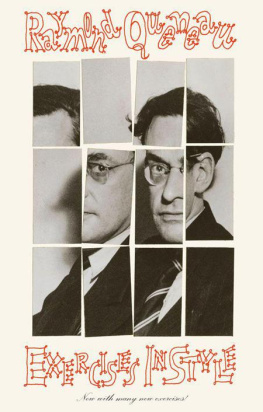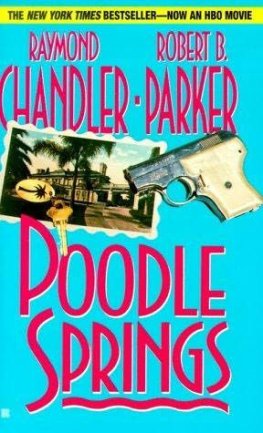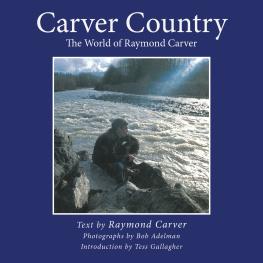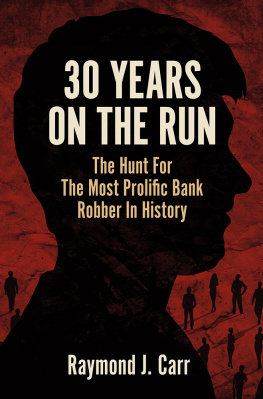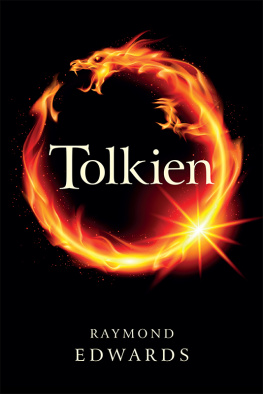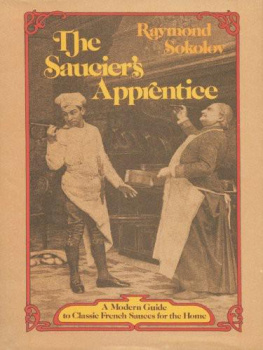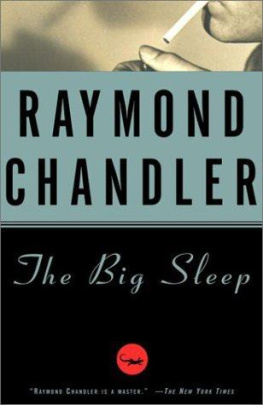Queneau Raymond - Exercises in Style
Here you can read online Queneau Raymond - Exercises in Style full text of the book (entire story) in english for free. Download pdf and epub, get meaning, cover and reviews about this ebook. year: 2013, publisher: Norton, genre: Detective and thriller. Description of the work, (preface) as well as reviews are available. Best literature library LitArk.com created for fans of good reading and offers a wide selection of genres:
Romance novel
Science fiction
Adventure
Detective
Science
History
Home and family
Prose
Art
Politics
Computer
Non-fiction
Religion
Business
Children
Humor
Choose a favorite category and find really read worthwhile books. Enjoy immersion in the world of imagination, feel the emotions of the characters or learn something new for yourself, make an fascinating discovery.
- Book:Exercises in Style
- Author:
- Publisher:Norton
- Genre:
- Year:2013
- Rating:4 / 5
- Favourites:Add to favourites
- Your mark:
- 80
- 1
- 2
- 3
- 4
- 5
Exercises in Style: summary, description and annotation
We offer to read an annotation, description, summary or preface (depends on what the author of the book "Exercises in Style" wrote himself). If you haven't found the necessary information about the book — write in the comments, we will try to find it.
Exercises in Style — read online for free the complete book (whole text) full work
Below is the text of the book, divided by pages. System saving the place of the last page read, allows you to conveniently read the book "Exercises in Style" online for free, without having to search again every time where you left off. Put a bookmark, and you can go to the page where you finished reading at any time.
Font size:
Interval:
Bookmark:
EXERCISES IN STYLE
by Raymond Queneau

Translated by Barbara Wright
with new exercises translated by Chris Clarke
and exercises in homage to Queneau
by Jesse Ball, Blake Butler, Amelia Gray,
Shane Jones, Jonathan Lethem, Ben Marcus,
Harry Mathews, Lynne Tillman, Frederic Tuten,
and Enrique Vila-Matas
A NEW DIRECTIONS BOOK
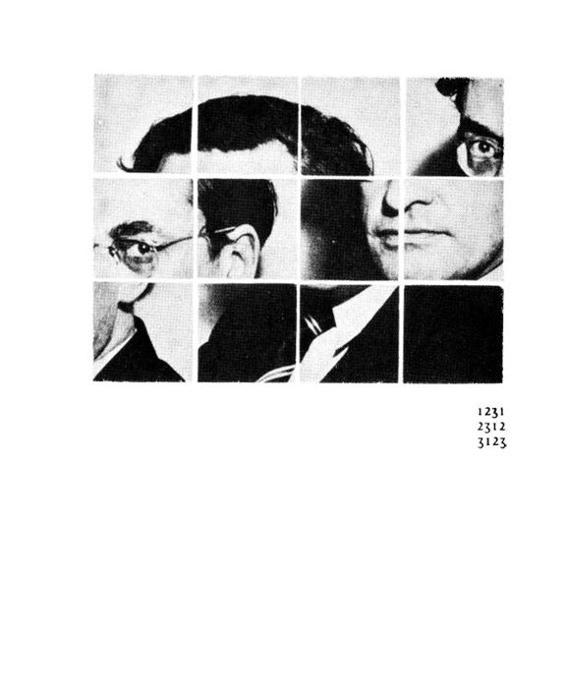
see: permutations, pages 113117
CONTENTS
EXERCISES IN STYLE (1958 edition)
MORE EXERCISES IN STYLE BY RAYMOND QUENEAU
QUENEAU'S 1973 SUBSTITUTIONS
EXERCISES PUBLISHED OUTSIDE OF EXERCICES DE STYLE
UNPUBLISHED EXERCISES
EXERCISES IN HOMAGE TO RAYMOND QUENEAU
Ladies and Gentlemen:
From time to time people politely ask me what I am translating now.
So I say: a book by Raymond Queneau.
They usually react to that in one of 3 different ways.
Either they say: that must be difficult.
Or they say: Whos he?
Or they say: Ah.
Of those three reactions, lets take the thirdas the fortune-tellers say.
People say: Ah.
By: Ahthey dont mean quite the same as the people who say: Whos he? They mean that they dont know who Queneau is, but that dont much care whether they know or not. However, since, as I said, this sort of conversation is usually polite, they often go on to enquire: What book of his are you translating?
So I say: Exercices de Style,
And then, all over again, they say: Ah.
At this point I usually feel it would be a good idea to say something about this book, Exercices de Style, but as its rather difficult to know where to begin, if Im not careful I find that my would-be explanation goes rather like this:
Oh yes, you know, its the story of a chap who gets into a bus and starts a row with another chap who he thinks keeps treading on his toes on purpose, and Queneau repeats the same story 99 times in a different waysits terribly good...
So Ive come to the conclusion that it is thus my own fault when these people I have been talking about finally stop saying Ah and tell me that its a pity I always do such odd things. Its not that my wooffly description is inaccuratethere are in fact 99 exercises, they all do tell the same story about a minor brawl in a bus, and they are all written in a different style. But to say that much doesnt explain anything, and the Exercices and the idea behind them probably do need some explanation.
In essaying an explanation, or rather, perhaps, a proper description, I have an ally in this gramophone record, which has recently been made in France, of 22 of the 99 exercices. It is declaimed and sung by les Frres Jacqueswho have been likened to the English Goons. You will hear that the record is very funny. I said it was an ally, yet on the other hand it may be an enemy, because it may lead you to think that the exercices are just funny and nothing else. I should like to return to this point later, but first I want to say something about the author of the Exercices.
Raymond Queneau has written all the books you see here on the tableand others which I havent been able to get hold of. He is a poetnot just a writer of poetry, but a poet in the wider sense. He is also a scholar and mathematician. He is a member of the Acadmie Goncourt (and they have only 10 members, in comparison with the 40 of the Acadmie Franaise), and he is one of the top boys of the publishing house of Gallimard. But he is a kind of writer who tends to puzzle people in this country because of his breadth and rangeyou cant classify him. He is one of the most influential and esteemed people in French literaturebut he can write a poem like this:
Ce soir
si jcrivais un pome
pour la postrit?
fichtre
la belle ide
je me sens sr de moi
jy vas
et
la
postrit
jy dis merde et remerde
et reremerde
drlement feinte
la postrit
qui attendait son pome
ah mais
Queneau, you see, is not limited, and he doesnt take himself over-seriously. Hes too wise. He doesnt limit himself to being either serious or frivolousor And all this is, I think, the reason why you find people in England who dont know who Queneau is. Two of his novels were published here, by John Lehmann, in English translations, about 10 years ago. They were, I think, not very successful here. Even though the critics thought they were writing favourably about them. I was looking through the reviews of one of themPierrotthe other day, and this brings me back to what I was saying about Queneaus wit and lightness of touch being possibly misleadingthe books very brilliance seemed to blind the critics to the fact that it was about anything. The New Statesman wrote: Pierrot is simply a light-hearted little fantasy..., and Time & Tide came down to Parish Magazine style: This novel is of the kind called so very french. It is all very unassuming and amusing, and most of us enjoy this kind of fun. According to the current way of thinking (or not-thinking), it seems that if we are to enjoy anything then we must not have to think about it, and, conversely, if we are to think about anything, then we mustnt enjoy it. This is a calamitous and idiotic division of functions.
And this, I think, brings me to the Exercices de Style. Queneau is a linguist, and he also has a passionate interest in the French language. He has given a lot of thought to one aspect of itthe French language as actually spoken. In Batons, Chiffres et Lettres, he writes: I consider spoken French to be a different language, a very different language, from written French. And in the same book, he says: I came to realise that modern written French must free itself from the conventions which still hem it in, (conventions of style, spelling and vocabulary) and then it will soar like a butterfly away from the silk cocoon spun by the grammarians of the 16th century and the poets of the 17th century. It also seemed to me that the first statement of this new language should be made not by describing some popular event in a novel (because people could mistake ones intentions), but, in the same way as the men of the 16th century used the modern languages instead of latin for writing their theological or philosophical treatises, to put some philosophical dissertation into spoken French.
Queneau did in fact put some philosophical dissertation into spoken FrenchDescartes Discours de la Mthode. At least, he says that it was with this idea in mind that he started to write something which later became a novel called le Chiendent. I wont say anything about the correspondence between it and le Chiendent now, but this novel, le Chiendent, is one of the easiest to read of all Queneaus novels, and also one of the most touching and thought-provoking. It is also almost farcically funny in parts.
This research into language is, of course, carried on in the Exercices. You get plenty of variations of the way different people actually speakcasual, noble, slang, feminine, etc. But you may have noticed that the exercise on p. 129 starts like this:
JO UN VE UR MI RS SU DI AP RL TE (thats in French, by the way. The English translation naturally looks quite different:
ED ON TO AY RD WA ID SM YO DA HE
Now please dont think that Im going to try to persuade you that this is Queneaus idea of how anyone speaks French. You cant really discover 99 different ways of speaking one language. Well, perhaps you can, but you dont find them in the
Next pageFont size:
Interval:
Bookmark:
Similar books «Exercises in Style»
Look at similar books to Exercises in Style. We have selected literature similar in name and meaning in the hope of providing readers with more options to find new, interesting, not yet read works.
Discussion, reviews of the book Exercises in Style and just readers' own opinions. Leave your comments, write what you think about the work, its meaning or the main characters. Specify what exactly you liked and what you didn't like, and why you think so.

